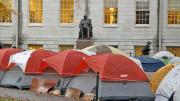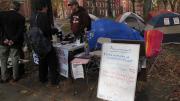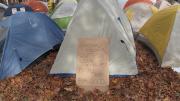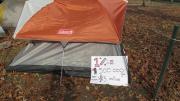From her spot inside Occupy Harvard’s tent city, Hannah Hofheinz watched police officers in fluorescent jackets stop every person walking through the gates of Harvard Yard on Monday, turning away anyone who didn’t possess a university-issued ID. “I do not understand the administration’s decision to fear people coming together for good,” lamented the fifth-year doctoral candidate at the Divinity School. “I love Harvard, and I would hope better for Harvard...It’s a straight-up shame.”
University Police and security guards imposed a lockdown on Harvard Yard since the November 9 campus protest, which involved more than 350 participants supporting the Occupy Wall Street movement begun in Manhattan in September 2011. In an e-mail to the Harvard community, executive vice president Katie Lapp and University provost Alan Garber said that even though the administration respects the right of community members to protest, the lockdown would continue as long as the students’ encampment—about 23 tents—remains.
“Securing access to the Yard is necessary for the safety of the freshmen and others who live and work in the Yard, for the students who will be sleeping outdoors as part of the protest, and for the overall campus,” Lapp and Garber wrote.
While other Occupy protests, including one in downtown Boston, are clamoring against the general excesses of Wall Street, Harvard’s protesters are primarily concerned with the roles the University and some of its alumni have played in recent financial crises.
“Many Harvard [graduates] were working in all the banks that were making the bad loans and ended up needing to get bailed out,” said third-year Divinity School student Jeff Bridges. “We’re here asking the administration to take that seriously.”
“This movement is a real mix,” Hofheinz said. “It includes undergraduates, graduate students, faculty, staff, Extension School students—it’s the Harvard community. And if the gates were open, it would be the true Harvard community.”
A number of students involved in Harvard protest were originally part of Occupy Wall Street and Occupy Boston, Bridges said. Picking up steam from the other Occupy movements, they assembled at Harvard Law School last Wednesday evening and tried to enter Harvard Yard, only to be met with locked gates. At around 10:30 p.m. that evening the gates were reopened, but only for those with a Harvard ID.
Protesters said the strict security—which excludes would-be protesters who are not Harvard affiliates—hindered a peaceful movement meant to address a list of grievances including Harvard’s role in perceived economic injustices, a lack of fair compensation within the community, job outsourcing, investments in certain private equity firms, and lack of financial transparency.
“The amount of money that’s being spent on gate security 24 hours a day is extraordinary,” Hofheinz said. (A University spokesman declined to comment on the amount being spent.) “If even part of that money were spent working with us on a viable security plan in this space, where all were welcome, wouldn’t that, one, be more cost effective, and two, be a lot more true to the ideals [of the school]?”
The Yard remained on lockdown Monday afternoon, keeping out not only demonstrators but also tourists and neighbors who might cut through the Yard on the way home. The administration said these measures were needed to protect students’ right “to live, study, and work in an educationally appropriate environment,” and to protect their safety. The Harvard Crimson reported that protesters tried to push their way into the Yard when asked for identification on Wednesday evening; although the “Occupy” protests have been peaceful for the most part, violent incidents have been reported in several cities.
Still, protesters at Harvard said Monday that the movement had been an overall success, and said they would not be deterred by external forces such as impending winter weather and security. “To me, occupation is not about the future. Occupation is about the fact that we are here now,” Hofheinz said. “Conversation is happening now. We have changed the conversation here, certainly.”












